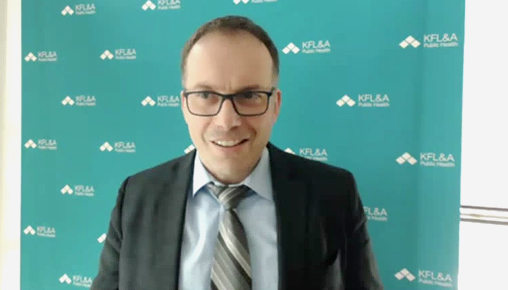Adam Prudhomme
Editor
Following a turbulent month when the KFLA Public Health Unit led in just about every undesirable COVID-19 related stat across the country, the region is now tops in Ontario for a positive category: vaccine uptake.
Speaking with local media via Skype on Wednesday, KFLA Public Health medical officer of health Dr. Piotr Oglaza outlined the numbers.
“We have now the highest rate of third dose coverage for 70 years and over individuals for the province,” said Oglaza. “We also have the highest dose for first rate coverage for those aged five to 11 years and we also have demonstrated the highest rate per capita of dose administration for the past few weeks. That’s really the reflection of the community effort. We could not have done this without the support and dedication of so many staff and partnerships that brought the community together to both vaccinate and get vaccinated.”
He further added that first dose coverage for individuals five and older is now at 91 per cent of the population and two dose coverage for those 12 and older is at 90.1 per cent.
As new active cases continue to rise-Wednesday saw 154 new cases reported for a total of 2,316 active-Oglaza said the vaccines are making a difference where it matters most: the ICU.
“Unvaccinated individuals have a slightly higher risk of being infected with COVID, that’s about 1.2 times higher than those who are vaccinated with two doses,” said Oglaza. “But at the same time they have a substantially higher risk of being hospitalized. That goes up to six times as likely compared to those vaccinated with two doses. Even higher risk of ending up in the ICU, which is about 18 times higher than those immunized with two doses. So this is really important to keep in mind when looking at our local stats, especially with our vaccinations. Even though they may not prevent infection, they do prevent serious illness and they do prevent hospitalizations, ICU admissions and deaths.”
The skyrocketing cases associated with the Omicron strain of the virus have caused health units to re-evaluate how they track their numbers.
“We will be gauging our local situation based on hospitalization (caused by COVID-19),” said Oglaza. “So far these are very promising statistics. I’m not saying that is necessarily the situation for the rest of the province, but at least locally we see that significant protection that our residents are getting from vaccine despite at some point being the region with the highest rates of Omicron.”
Though the number of people being admitted to hospitals is still a concern, the numbers do appear to be declining and are still much better than those seen at the height of the Delta variant.
“While our local hospital numbers are high, they are now lower than what they were at the peak of the Delta wave,” said Oglaza. “Our current numbers (as of Wednesday) are 18 individuals hospitalized and the peak of the Delta wave was 32. Ten individuals (as of Wednesday) in the ICU with the historical max during the peak of the Delta wave at 14 and seven ventilated with the maximum that we experienced earlier was 12.”
Oglaza said most of the local patients on a ventilator are those who tested positive for the Delta variant.
Oglaza says the region’s high rate of vaccine uptake gives him reason to be optimistic.
“There’s strong evidence to indicate vaccine is protective,” said Oglaza. “It may not be protecting against infection but it does protect against the outcomes that matter the most. It prevents people from getting seriously sick and getting hospitalized and getting admitted to ICU and dying. That’s really the strong protection that the vaccine can give. People in the community also responded to this by showing up to the clinics. We have seen a tremendous uptake from the community, people who are confident that this is the right thing to do and vaccine will protect them and with the numbers growing like that this is something that puts us in a really good position for the rest of the respiratory season, for the rest of the Omicron wave.”
The medical officer of health offered his thanks to the hundreds of volunteers who assisted at vaccine clinics over the holidays and the thousands of people who rolled up their sleeves to get their needle.
As always Oglaza continued to stress the importance of limiting social interaction, getting vaccinated and staying home when sick to help limit the spread of the disease.
On the topic of schools, Oglaza said he supported the province’s decision to delay the return to in-person learning so as to give staff more time to implement safety measures. He says the benefits of in-person learning are too great when compared to the benefit of online learning and hopes to have students back in school later this month.
“I strongly support the re-opening of schools for in-person learning as soon as possible,” said Oglaza. “I certainly hope schools will return to in-person learning as indicated by the provincial government and we are supporting the provincial government with this decision. Anything we can locally to facilitate that we will do and it is my sincere hope that the school will be re-opening as soon as indicated by the provincial government.”

